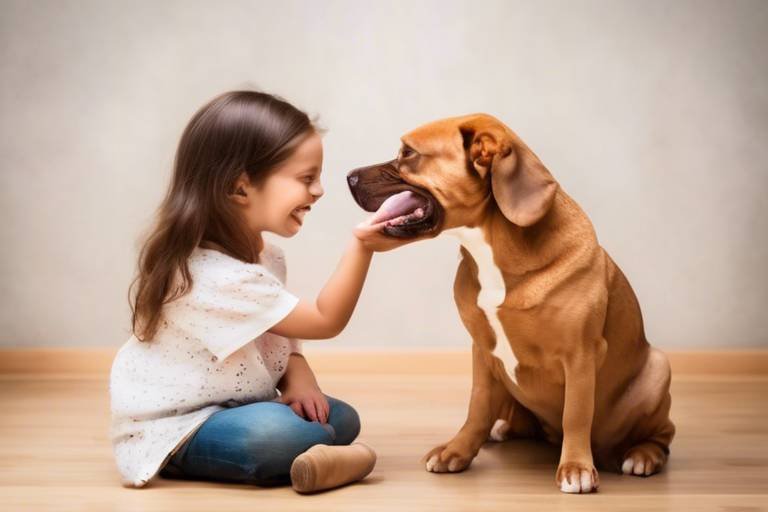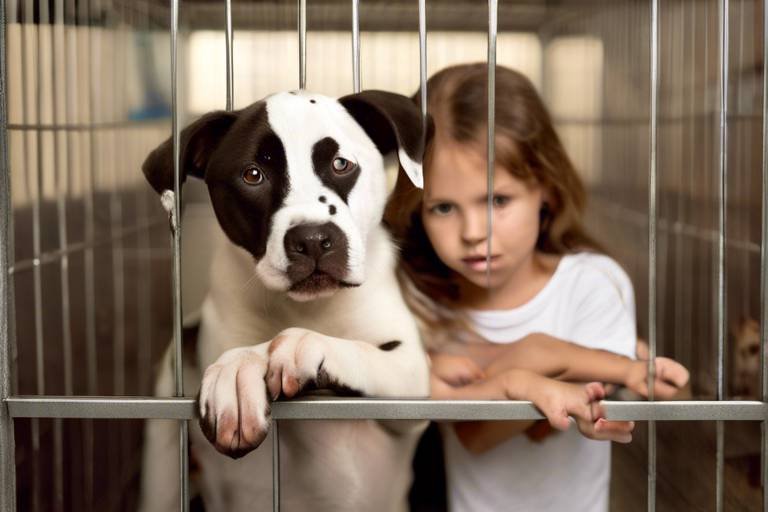The Emotional Connection Between Pets and Their Owners
Have you ever noticed how your furry friend seems to know when you're feeling down? It's almost as if they have a sixth sense! The bond between pets and their owners goes far beyond simple companionship; it's a profound connection that can transform our lives in unexpected ways. In this article, we're diving deep into the emotional ties that bind us to our beloved pets, exploring the psychological benefits, the comfort they provide, and the unique experiences that enrich our relationships with them.
Owning a pet isn't just about having a cute companion to cuddle with; it can significantly enhance your mental health. Studies have shown that pets can reduce stress and anxiety levels while boosting feelings of happiness and companionship. Imagine coming home after a long day, and there’s your dog wagging its tail, or your cat purring softly on your lap. This simple interaction can trigger the release of oxytocin, often referred to as the "love hormone," which promotes bonding and emotional well-being. The joy and laughter that pets bring into our lives can act as natural antidotes to feelings of depression and loneliness.
For many people, especially those living alone or facing social isolation, pets provide an invaluable source of companionship. They are not just animals; they become integral parts of our lives, offering comfort and a sense of purpose. When you have a pet, you’re never truly alone. The routine of caring for a pet—feeding them, walking them, and just spending time together—creates a sense of responsibility and connection that can help alleviate feelings of loneliness. Imagine waking up each morning to a wagging tail or a gentle nudge; it’s a reminder that you are loved and needed.
Many individuals rely on their pets for emotional support, which is why they are often recognized as emotional support animals (ESAs). These animals provide not only companionship but also a sense of safety and stability. For those struggling with mental health issues, the presence of a pet can be incredibly therapeutic. They can sense when their owners are feeling anxious or depressed and often respond in ways that provide comfort. Whether it's curling up beside you during a tough moment or playfully nudging you to get up and move, pets have a unique ability to lift our spirits. In fact, studies suggest that having a pet can lower cortisol levels, the hormone associated with stress.
One of the most beautiful aspects of pet ownership is the unconditional love that pets offer. Unlike humans, pets don’t judge us; they simply love us for who we are. This kind of love can be transformative, providing emotional healing and strengthening the bond between pets and their humans. When life gets tough, knowing that you have a loyal companion who loves you unconditionally can make all the difference. It's like having a constant source of positivity and support, reminding you that you’re never alone in your struggles.
Have you ever noticed how your pet seems to know when you’re feeling sad? Animals often have an intuitive nature that allows them to sense their owner’s emotions. They can pick up on subtle cues, such as changes in body language or tone of voice, and respond accordingly. This intuitive connection can provide comfort during difficult times, making pets not just companions but also emotional anchors. When you’re feeling overwhelmed, having a pet that cuddles up to you or nudges you for attention can be incredibly soothing, reinforcing the bond you share.
Pets also play a vital role in family dynamics. They can enhance relationships among family members by promoting bonding and shared responsibilities. Caring for a pet can be a family affair, teaching children empathy and responsibility while creating lasting memories. Imagine a family game of fetch in the backyard or cozy movie nights with your cat curled up in your lap. These shared experiences not only strengthen family ties but also create a nurturing environment where everyone feels valued and loved.
The presence of pets can lead to improved physical health, too! Owning a pet often encourages more activity, which is essential for maintaining a healthy lifestyle. Whether it’s taking your dog for a walk or playing with your cat, these activities can help keep you active and engaged. Moreover, pets can provide companionship that motivates owners to stay active, leading to a more fulfilling life.
Owning a pet often means more outdoor adventures! Dogs, in particular, require regular walks, which can turn into enjoyable exercise sessions for their owners. This not only helps in maintaining physical fitness but also allows for social interactions with other pet owners. Think of it as a win-win situation: you get to exercise while also making new friends in the process!
Studies suggest that pet ownership can lower blood pressure and reduce the risk of heart disease. The calming presence of a pet, combined with the physical activity associated with pet care, creates a positive impact on cardiovascular health. It's like having a built-in wellness program right at home! So, if you’re looking for a way to boost your heart health, consider adopting a furry friend!
- How do pets improve mental health? Pets provide companionship, reduce stress, and increase feelings of happiness.
- Can pets help with loneliness? Yes, pets offer companionship and can alleviate feelings of isolation.
- What are emotional support animals? Emotional support animals provide comfort and stability to individuals with mental health challenges.
- How do pets sense human emotions? Pets can pick up on body language and vocal tones, allowing them to respond to their owners' feelings.

The Psychological Benefits of Pet Ownership
Owning a pet is like having a furry little therapist right at home. It’s incredible how these animals can change our lives for the better! Research shows that pets have a profound impact on our mental health, acting as a source of joy, comfort, and companionship. Imagine coming home after a long, stressful day at work, and there’s your dog wagging its tail, or your cat purring softly in your lap. It’s a simple yet powerful reminder that you are loved unconditionally. This emotional connection can significantly reduce feelings of stress and anxiety, creating a sense of calm and happiness in our lives.
Studies have found that pet owners often report higher levels of happiness and lower levels of depression compared to those without pets. The simple act of petting a dog or cat can release oxytocin, the "feel-good" hormone, which fosters feelings of love and connection. When you interact with your pet, you’re not just playing; you’re engaging in a therapeutic activity that boosts your mood and overall well-being. It’s like a natural antidepressant, but furrier!
Furthermore, pets can provide a sense of purpose. Taking care of another living being can help individuals feel needed and valued. For many, especially the elderly or those living alone, pets become a reason to get up in the morning. They offer a routine and responsibility that can be incredibly fulfilling. When you have to feed, walk, or play with your pet, you’re not just taking care of them; you’re also nurturing your own mental health.
Additionally, pets can help improve social interactions. Dog owners often find themselves chatting with other dog owners during walks or at the park. This social engagement can help combat feelings of isolation and loneliness, fostering a sense of community. It’s as if your pet becomes a social facilitator, opening doors to new friendships and connections. In fact, studies suggest that pet owners are often perceived as more approachable and friendly, making it easier to strike up conversations and build relationships.
To summarize the psychological benefits of pet ownership, here’s a quick overview:
| Benefit | Description |
|---|---|
| Stress Reduction | Interacting with pets lowers cortisol levels, which helps to reduce stress. |
| Increased Happiness | Pets release oxytocin, enhancing feelings of joy and connection. |
| Sense of Purpose | Caring for pets provides routine and responsibility, boosting self-worth. |
| Improved Social Interactions | Pets facilitate social connections, reducing feelings of loneliness. |
In conclusion, the psychological benefits of pet ownership are vast and transformative. From reducing stress and anxiety to enhancing social interactions, pets play a vital role in our emotional well-being. So, if you’re considering bringing a furry friend into your life, know that you’re not just gaining a pet; you’re gaining a companion that can enrich your mental health in ways you never imagined!
- How do pets help with anxiety? Pets provide companionship and unconditional love, which can help alleviate feelings of anxiety and loneliness.
- Can pets improve my mood? Yes! Interacting with pets releases hormones that enhance feelings of happiness and reduce stress.
- Do pets help with depression? Many studies suggest that pet ownership can lead to lower rates of depression due to the emotional support they provide.
- What types of pets are best for mental health? Dogs and cats are the most common pets associated with mental health benefits, but even small animals like rabbits or guinea pigs can provide companionship.

In a world that often feels disconnected, pets have an incredible ability to bridge the gap between solitude and companionship. For many individuals, especially those living alone or facing social isolation, the presence of a furry friend can transform an empty space into a lively home filled with warmth and affection. Imagine coming home after a long day, greeted by an enthusiastic wagging tail or a gentle purr; it's like receiving an instant dose of happiness. This emotional support is not just about having someone to cuddle with; it’s about the profound bond that develops over time, which can significantly alleviate feelings of loneliness.
Studies have shown that pet ownership can lead to a remarkable decrease in feelings of isolation. When you have a pet, you have a reason to get up in the morning, to engage with the world, and to maintain a routine. Pets thrive on consistency, and in return, they provide their owners with a sense of purpose. Whether it’s taking your dog for a walk, playing with your cat, or even just watching your fish swim, these daily interactions can foster a sense of belonging and connection.
Moreover, pets can act as social catalysts. When you’re out walking your dog, striking up a conversation with a fellow pet owner becomes much easier. Pets provide common ground, a shared experience that can lead to new friendships. This can be particularly beneficial for those who find it challenging to initiate social interactions. The simple act of sharing a smile or a laugh over a playful pet can break down barriers and create bonds that might not have formed otherwise.
Additionally, the companionship that pets offer can be especially crucial during tough times. They have an uncanny ability to sense when their owners are feeling down or stressed. Many pet owners report that their animals seem to know when they need a little extra love. This intuitive nature is a testament to the deep emotional connection that exists between pets and their humans. When you’re feeling lonely, having a pet by your side can provide comfort that is both immediate and profound. It’s like having a friend who is always there, ready to listen without judgment.
In essence, pets are more than just animals; they are companions that enrich our lives in countless ways. They fill our homes with joy, our hearts with love, and our days with purpose. The emotional support they provide is invaluable, making them essential allies in the fight against loneliness. So, if you ever find yourself feeling isolated, consider the wonderful companionship that a pet can offer. It might just be the best decision you ever make!
- How can pets help with loneliness? Pets provide companionship, encourage routine, and can act as social facilitators, helping to reduce feelings of isolation.
- What types of pets are best for reducing loneliness? Dogs and cats are often considered the best companions, but even smaller pets like rabbits or guinea pigs can provide emotional support.
- Can pets sense when I'm feeling lonely? Yes, many pets have an intuitive nature and can often sense their owner's emotions, providing comfort during tough times.
When life throws us curveballs, it’s often our furry companions that stand by us, offering a sense of comfort and stability that can be hard to find elsewhere. Pets as emotional support animals play a pivotal role in helping individuals navigate the stormy seas of mental health challenges. They are not just pets; they are confidants, cheerleaders, and, most importantly, a source of unconditional love. Imagine coming home after a long, exhausting day, and there’s your dog, tail wagging, ready to greet you with pure joy. This simple interaction can significantly lift your spirits and make you feel valued.
Research has shown that animals, particularly dogs and cats, have an innate ability to sense human emotions. This intuitive nature allows them to respond to our feelings in ways that can be incredibly healing. For instance, when someone is feeling anxious or depressed, their pet might snuggle closer or nuzzle them, providing a comforting presence that can alleviate stress. This connection is not just heartwarming; it is scientifically backed. Studies indicate that spending time with pets can release oxytocin, the hormone associated with bonding and affection, which can lead to reduced feelings of anxiety and increased happiness.
Furthermore, the presence of an emotional support animal can help individuals feel more secure in social situations. For many, the anxiety of interacting with others can be overwhelming. However, having a pet by their side can serve as a grounding mechanism, making it easier to engage with the world around them. It’s like having a safety net; the pet provides a sense of normalcy and comfort in what might otherwise feel like an intimidating environment.
Consider the following benefits of having pets as emotional support animals:
- Reduced Anxiety: The mere act of petting a dog or cat can lower cortisol levels, the hormone associated with stress.
- Increased Social Interaction: Pets can serve as social facilitators, making it easier for their owners to connect with others.
- Enhanced Mood: The joy and companionship that pets provide can significantly uplift one’s mood.
Moreover, emotional support animals are not limited to dogs and cats. Animals like rabbits, birds, and even miniature pigs have been known to provide comfort and support. The key is the bond between the owner and the animal, which can be incredibly profound, regardless of the species. This bond is often characterized by mutual understanding and affection, making it a unique relationship that can greatly enhance emotional well-being.
In conclusion, the role of pets as emotional support animals cannot be overstated. They not only provide companionship but also serve as a crucial element in managing mental health. By offering unconditional love, intuitive understanding, and a sense of security, pets become more than just animals; they become invaluable partners in our journey toward emotional stability.
- What qualifies an animal as an emotional support animal? An emotional support animal is any animal that provides comfort and support to an individual, helping alleviate symptoms of mental health conditions.
- Do emotional support animals require special training? Unlike service animals, emotional support animals do not require specific training, but they should be well-behaved and comfortable in various situations.
- Can any pet be an emotional support animal? Yes, any pet can serve as an emotional support animal as long as it provides comfort to its owner.
When we talk about the bond between pets and their owners, one of the most profound aspects is the unconditional love that pets provide. This is not just a fluffy concept; it's a transformative experience that can significantly impact our emotional well-being. Imagine coming home after a long, exhausting day, and there, wagging its tail or purring softly, is your pet, ready to greet you with boundless affection. This simple act of love can melt away the stress and worries of the day, reminding us that we are valued and cherished.
Unconditional love from pets fosters a sense of security and belonging. Unlike human relationships, where complexities and misunderstandings can arise, pets offer a straightforward and honest connection. They don’t judge, they don’t hold grudges, and they are always there, ready to provide comfort. This deep-rooted sense of acceptance can be incredibly healing, especially for those dealing with emotional turmoil or mental health challenges. The presence of a loving pet can create a safe haven, a space where one can truly be themselves without fear of criticism.
Moreover, the unconditional love that pets offer can lead to significant emotional healing. For many individuals, pets become a source of strength during tough times. Whether it’s a dog snuggling close during a moment of sadness or a cat sitting quietly beside you while you reflect, these moments are not just comforting; they are essential for emotional recovery. It’s almost as if pets have an innate ability to sense when we are struggling, providing their love in the most needed moments. This intuitive nature of pets enhances the bond, making it even more special.
To illustrate the impact of this unconditional love, consider the following table that outlines some of the emotional benefits associated with pet ownership:
| Emotional Benefits | Description |
|---|---|
| Reduced Anxiety | Pets can decrease feelings of anxiety through their calming presence. |
| Increased Happiness | The joy of pet companionship can elevate overall mood and happiness levels. |
| Enhanced Self-Esteem | Being loved unconditionally by a pet boosts self-worth and confidence. |
| Emotional Support | Pets provide a non-judgmental source of support during difficult times. |
In conclusion, the importance of unconditional love from pets cannot be overstated. It plays a vital role in our emotional health, offering us a unique type of companionship that is both fulfilling and healing. This bond not only enriches our lives but also teaches us valuable lessons about love, loyalty, and acceptance. So, the next time you hug your furry friend, remember that this relationship is a two-way street, filled with love that knows no bounds.
- How can pets improve mental health? Pets provide companionship, reduce feelings of loneliness, and offer emotional support, which can significantly enhance mental well-being.
- What types of pets are best for emotional support? Dogs and cats are the most common emotional support animals, but other pets like rabbits and guinea pigs can also provide comfort.
- Can pets sense human emotions? Yes, many pets have an intuitive ability to sense their owner's emotions and often respond accordingly, offering comfort when needed.
- How does pet ownership affect family dynamics? Pets can strengthen family bonds through shared responsibilities and experiences, fostering a nurturing environment.
The bond between pets and their owners often transcends mere companionship; it's a connection that can feel almost magical at times. Have you ever noticed how your furry friend seems to know when you're feeling down? This remarkable ability to sense human emotions is one of the most captivating aspects of pet ownership. Pets, especially dogs and cats, have an innate intuition that allows them to pick up on our feelings, providing comfort and support when we need it the most.
Research suggests that animals can detect changes in human behavior and even physiological signals. For instance, they might sense when their owner is stressed or anxious by noticing changes in body language, tone of voice, or even through the release of specific pheromones. This intuitive nature is not just a coincidence; it's a product of centuries of co-evolution between humans and their pets. As we have developed our emotional landscapes, so too have our pets honed their abilities to understand and respond to us.
Imagine coming home after a long, exhausting day. You might be feeling overwhelmed, but as soon as you walk through the door, your dog greets you with wagging tails and joyful barks. It's as if they can feel your energy shift. This reaction isn't just instinctual; it's a profound response to your emotional state. Pets often become our emotional mirrors, reflecting our feelings back to us and offering unconditional support. Their presence can be a soothing balm, easing the burdens we carry.
Moreover, the intuitive nature of pets can also foster a deeper understanding between owners and their beloved companions. Many pet owners report feeling a strong emotional bond with their animals, often describing it as a two-way street of empathy. This connection can lead to a more profound sense of companionship, as both parties learn to communicate and respond to each other's needs. Whether it's a gentle nudge from a cat when you're feeling down or a comforting presence from a dog during tough times, these interactions highlight the emotional intelligence of our pets.
In essence, the intuitive abilities of pets not only enhance their role as companions but also contribute significantly to our emotional well-being. They remind us that we are not alone in our struggles and that love and support can come from the most unexpected places. In recognizing and appreciating this unique aspect of pet ownership, we can cultivate a deeper, more fulfilling relationship with our furry friends.
- How do pets sense human emotions? Pets can pick up on subtle cues such as body language, tone of voice, and even scents associated with emotional states.
- Can pets help with anxiety and depression? Yes, many studies have shown that pets can provide emotional support and reduce feelings of anxiety and depression.
- What types of pets are best for emotional support? Dogs and cats are the most common pets used for emotional support, but other animals like rabbits and birds can also provide companionship.
- Do all pets have intuitive abilities? While many pets exhibit intuitive behaviors, the level of intuition can vary widely among different species and individual animals.
When we think about family, we often envision a group of people bonded by love, shared experiences, and responsibilities. But what if we told you that pets can enhance this dynamic even further? That's right! Pets are not just cute companions; they play a vital role in shaping family relationships. Imagine a family gathering where everyone is laughing and having fun, and in the middle of it all, there’s a dog wagging its tail, bringing smiles to everyone’s faces. This is the magic that pets bring into our lives.
Having a pet can create a sense of unity within a family. They become a common interest, a focal point for activities, and a shared responsibility that brings everyone together. From feeding the dog to taking the cat for a vet check-up, these tasks require teamwork. This shared responsibility fosters communication and collaboration among family members. Plus, it’s a great way to teach children about empathy and care. When kids learn to take care of a pet, they also learn valuable life skills that will serve them well as they grow.
Pets can also serve as a bridge during tough times. Families often face challenges, be it financial stress, health issues, or simply the chaos of daily life. In these moments, pets can provide a comforting presence. For instance, a family dealing with the loss of a loved one might find solace in their dog, who is always there to offer companionship and unconditional love. The simple act of petting a dog or cat can release endorphins, helping to reduce stress and anxiety. In this way, pets become emotional anchors, helping families navigate through life's ups and downs.
Moreover, the presence of pets can enhance the overall atmosphere of a household. A home with a pet often feels livelier and more inviting. The playful antics of a puppy or the gentle purring of a cat can lighten the mood, making it easier for family members to bond over shared laughter. It’s not uncommon for families to have inside jokes revolving around their pets, creating cherished memories that last a lifetime. These moments of joy and laughter are crucial in building strong family ties.
It's also interesting to note how pets can help in conflict resolution. When disagreements arise, a pet can serve as a neutral party, helping to diffuse tension. For example, if siblings are arguing, a playful dog might jump in, redirecting their focus and prompting them to play together instead. This can lead to laughter and, ultimately, reconciliation. In this way, pets contribute to a more harmonious home environment.
In conclusion, the impact of pets on family dynamics is profound and multifaceted. They not only enhance relationships but also provide emotional support and foster a nurturing environment. So, if you're considering adding a furry member to your family, remember that you're not just bringing home a pet; you're inviting a new dynamic that can enrich your lives in countless ways.
- How do pets improve family relationships? Pets encourage shared responsibilities and create opportunities for bonding through activities like walking, playing, and caring for them.
- Can pets help reduce family stress? Yes, pets provide emotional support, help alleviate anxiety, and can serve as a comforting presence during tough times.
- What role do pets play in teaching children? Pets teach children empathy, responsibility, and the importance of caring for others, which are valuable life skills.
- How can pets help resolve family conflicts? Pets can act as a distraction during disagreements, promoting laughter and play, which can lead to reconciliation.

When you think about the joy a pet brings, it’s easy to overlook the numerous physical health benefits they offer. Believe it or not, having a furry friend can lead to a healthier lifestyle in more ways than one. From encouraging regular exercise to providing companionship that can lower stress levels, pets are more than just adorable companions; they can be your ticket to better health!
One of the most significant ways pets contribute to our physical well-being is by promoting an active lifestyle. Imagine this: you come home from a long day, and your dog greets you with wagging tails and eager eyes, practically begging for a walk. Suddenly, you find yourself lacing up your shoes and stepping outside, where the fresh air and gentle breeze invigorate your spirit. This simple act not only benefits your furry friend but also gets your blood pumping and muscles moving. Regular walks, playtime, and even just running around the yard can lead to improved cardiovascular health, enhanced endurance, and a reduction in obesity. In fact, studies have shown that dog owners are more likely to meet the recommended levels of physical activity than those without pets.
Moreover, the bond between pets and their owners can also significantly impact heart health. Research indicates that pet ownership is associated with lower blood pressure and cholesterol levels, which are crucial factors in reducing the risk of heart disease. Just being around your pet can lower your stress hormones, allowing your heart to relax and function more efficiently. It’s almost as if your pet has a sixth sense about your emotional state, helping to ease your worries and promote a sense of calm. This is particularly important in today’s fast-paced world, where stress is often a constant companion.
To illustrate these benefits, here’s a quick overview of how pets can enhance physical health:
| Health Benefit | Description |
|---|---|
| Increased Physical Activity | Regular walks and playtime with pets encourage owners to engage in physical exercise. |
| Lower Blood Pressure | Being around pets has been shown to reduce stress levels, which can lead to lower blood pressure. |
| Improved Heart Health | Pet ownership is linked to reduced cholesterol levels and a lower risk of heart disease. |
In addition to these physical benefits, pets can also help combat loneliness and depression, which can have indirect effects on physical health. When you have a pet, you’re not just gaining a companion; you’re also enhancing your overall quality of life. Whether it’s a cat curling up in your lap or a dog wagging its tail at your feet, these interactions can lift your spirits and encourage you to engage in healthier behaviors.
So, the next time you’re feeling a bit sluggish or down in the dumps, consider the incredible impact your pet has on your health. They're not just cute faces; they’re your little cheerleaders, motivating you to get up, get moving, and enjoy life to the fullest!
- How do pets encourage physical activity?
Pets, especially dogs, require regular walks and playtime, which naturally increases their owners' activity levels. - Can pets really help lower blood pressure?
Yes, studies show that interacting with pets can reduce stress and lower blood pressure. - What types of pets are best for physical health?
While dogs are often associated with increased activity, cats and even smaller pets can also promote a more active lifestyle through play and interaction.
When it comes to owning a pet, one of the most delightful perks is the boost in physical activity that comes along with it. Imagine this: you’re lounging on your couch, scrolling through your phone, when suddenly your furry friend nudges you with their nose, begging for a walk. This simple act can transform a sedentary day into an adventure filled with fresh air and exercise. Pets, especially dogs, are natural motivators, encouraging their owners to step outside and engage in physical activities that might otherwise be neglected.
Walking your dog isn’t just about letting them relieve themselves; it’s an opportunity for both of you to explore your surroundings, meet neighbors, and soak up the sunshine. Regular walks can significantly increase your daily step count, making it easier to maintain a healthy lifestyle. According to studies, dog owners are more likely to reach the recommended 150 minutes of moderate exercise per week compared to non-dog owners. This is not just a number; it’s a pathway to a healthier, happier life!
Moreover, pets can introduce you to new outdoor activities that you might not have considered before. Whether it’s hiking with your dog, playing fetch in the park, or even engaging in agility training, the possibilities are endless. Here’s a quick look at some fun outdoor activities you can enjoy with your pet:
- Hiking: Discover local trails and enjoy nature together.
- Running: Take your dog for a jog; they make great running buddies!
- Playing Fetch: A classic game that keeps both you and your pet active.
- Swimming: If your pet loves water, this can be a fun way to exercise.
Furthermore, engaging in these activities not only improves your physical health but also strengthens the bond between you and your pet. The shared experiences create lasting memories and enhance your emotional connection. Think of it like this: every time you lace up your sneakers and head out with your pet, you’re not just exercising; you’re building a partnership based on trust and companionship.
Lastly, let’s not forget the social aspect of exercising with a pet. Parks and pet-friendly events often serve as gathering spots for pet owners, allowing for social interactions that can lead to friendships. Whether you’re chatting with fellow dog owners during a walk or participating in a pet class, these interactions can significantly enhance your social life and provide a sense of community.
Q: How often should I exercise with my pet?
A: It’s recommended to exercise with your pet at least 30 minutes a day, but this can vary based on your pet’s breed and energy level.
Q: What are some good activities for older pets?
A: Older pets may enjoy gentle walks, light play sessions, or swimming, which is easy on their joints.
Q: Can I exercise with my cat?
A: Absolutely! Cats can enjoy interactive play sessions with toys, and some may even enjoy leash walks.
Q: What should I do if my pet doesn’t like outdoor activities?
A: Start slow! Some pets may take time to adjust. Try indoor exercises or shorter outdoor sessions to build their confidence.
When we think about the joy and companionship that pets bring into our lives, we often overlook their profound impact on our physical health, especially when it comes to heart health. Studies have shown that owning a pet can significantly lower blood pressure and cholesterol levels, which are crucial factors in reducing the risk of heart disease. Imagine having a furry friend who not only brightens your day but also contributes to your overall well-being!
One of the key reasons pets are beneficial for heart health is their ability to reduce stress. When you come home after a long day and are greeted by your wagging dog or purring cat, it's hard not to smile. This simple interaction can trigger the release of oxytocin, a hormone associated with bonding and relaxation. As you pet your animal, your heart rate slows down, and your blood pressure decreases. It's like a natural stress relief therapy that you never knew you needed!
Moreover, the act of caring for a pet encourages a more active lifestyle. For instance, dog owners often find themselves taking regular walks, which not only benefits their furry companions but also keeps their hearts healthy. A recent study highlighted that pet owners are more likely to engage in physical activities, leading to improved cardiovascular fitness. Here’s a quick summary of how pets can impact heart health:
| Benefit | Description |
|---|---|
| Lower Blood Pressure | Interactions with pets can reduce stress and lower blood pressure. |
| Improved Cholesterol Levels | Pet ownership is associated with healthier cholesterol levels. |
| Increased Physical Activity | Pets encourage regular exercise, promoting heart health. |
| Emotional Bonding | Pets provide emotional support, which can lead to lower stress levels. |
Additionally, studies have indicated that pet owners may experience lower rates of heart disease compared to non-pet owners. The companionship and love that pets provide can lead to lower levels of anxiety and depression, both of which are risk factors for heart complications. It’s fascinating to think that the simple act of having a pet around can translate into a healthier heart!
In conclusion, the impact of pets on heart health is significant and multifaceted. They not only provide emotional support and companionship but also encourage a lifestyle that promotes heart health. So, the next time you cuddle with your pet, remember that you’re not just enjoying their company; you’re also doing wonders for your heart!
- Can pets really lower blood pressure? Yes, studies have shown that interacting with pets can lead to lower blood pressure and stress levels.
- How do pets encourage physical activity? Pets, especially dogs, require regular walks and playtime, which encourages their owners to be more active.
- Are there specific pets that are better for heart health? While dogs and cats are popular, any pet that you connect with can provide emotional support and health benefits.
- What if I have allergies but want a pet? Consider hypoallergenic breeds or small pets like fish or reptiles that may not trigger allergies.
Frequently Asked Questions
- How do pets improve mental health?
Pets are like furry little therapists! Their presence can significantly reduce feelings of stress and anxiety. Just petting a dog or cat can release oxytocin, the love hormone, which boosts happiness. It's like having a built-in mood booster right at home!
- Can pets help with loneliness?
Absolutely! Pets are fantastic companions, especially for those who live alone. They provide comfort and a sense of purpose, making it easier to cope with feelings of isolation. Imagine coming home to a wagging tail or a soft purr; it’s like having a friend waiting for you!
- What is the role of pets as emotional support animals?
Emotional support animals are like emotional anchors. They provide comfort during tough times and can help individuals manage mental health issues. Their unwavering presence offers a sense of security, making them invaluable to many people.
- Why is unconditional love from pets important?
The unconditional love from pets can be transformative. It fosters a deep emotional bond that can lead to healing and personal growth. It's like having a relationship where you are always accepted, no matter what!
- How do pets sense their owners' emotions?
Pets are incredibly intuitive! They can often pick up on their owner's feelings through body language and vocal tones. When they sense sadness or stress, they instinctively provide comfort, acting as emotional support without even knowing it.
- What impact do pets have on family dynamics?
Pets can strengthen family bonds by creating shared responsibilities and experiences. They encourage teamwork in caring for them, and the joy they bring can lead to more family time spent together. It’s like having a family member that everyone loves!
- How do pets contribute to physical health?
Having a pet often leads to more physical activity, like walking or playing fetch. This increased activity can improve overall fitness and health. Think of it as having a personal trainer who just wants to play!
- Can pets lower the risk of heart disease?
Yes, studies suggest that pet ownership can lower blood pressure and reduce the risk of heart disease. The companionship and love pets provide can lead to a healthier heart, making them not just great friends but also heart protectors!



















